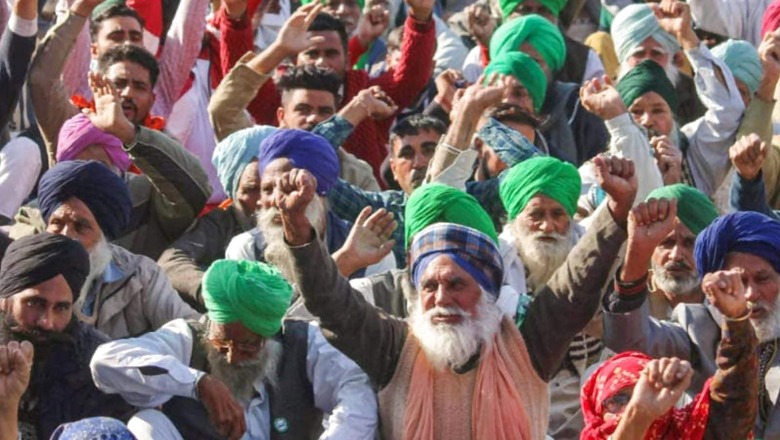
views
Prime Minister Narendra Modi, on the occasion of Parkash Purab of Sri Guru Nanak Dev on Friday, announced the withdrawal of the three farm laws and requested all farmers to return to their homes and farms. PM Modi said that the three farm laws were brought in specially to support small farmers so they get more options and better price for their produce. “But, we could not convince some farmers. Today I apologise if some farmers did not understand what we wanted to do through farm laws,” he said.
Here’s a complete timeline of the farm laws:
June 2020: The three farm laws – the Farmers’ Produce Trade and Commerce (Promotion and Facilitation) Act, 2020; Essential Commodities (Amendment) Act, 2020; and Farmers (Empowerment and Protection) Agreement on Price Assurance and Farm Services Act, 2020 – were promulgated by the Centre as ordinances. The Bharatiya Kisan Union(Ugrahan) issues a statement objecting to the ordinances. Farmers express their apprehension, saying the farm reforms would pave a way for the dismantling of the minimum support price system, leaving them at the “mercy” of big companies. Farmer protests start erupting in a phased manner in Punjab.
September 2020: Amid ongoing protests by farmers and opposition parties, President Ram Nath Kovind gives his assent to the three bills earlier passed by the Indian Parliament. Farmers in Punjab began a three-day ‘rail roko’ agitation bills. The Ferozepur Railway division is suspended the operation of special trains due to the stir. The call for ‘rail roko’ agitation is given by the Kisan Mazdoor Sangharsh Committee and later, different farmers’ outfits also extend their support.
October 2020: The Supreme Court sought response from the Centre on a batch of petitions challenging the constitutional validity of the newly enacted three contentious farm laws. A bench headed by then-Chief Justice S A Bobde issued notice to the central government and sought its reply within four weeks. The petitions were filed by Rashtriya Janta Dal lawmaker from Rajya Sabha, Manoj Jha; Congress Lok Sabha MP from Kerala, TN Prathapan and Dravida Munnetra Kazhagam Rajya Sabha MP from Tamil Nadu, Tiruchi Siva, and a Rakesh Vaishnav alleged that the three farm laws passed by Parliament would dismantle the Agricultural Produce Market Committees system intended to ensure fair prices for farm products. In Punjab, CM Amarinder Singh says that he was prepared to resign rather than bow to “injustice” meted out to Punjab farmers.
November 2020: Protest starts gathering momentum. Farmers’ leaders announce a nationwide road blockade – chakka jam – on as part of their protest. After such sporadic protests, thousands of farmers, on November 25, from Punjab and Haryana march towards the national capital demanding a complete repeal of the legislations, as part of a “Dilli Chalo” campaign. The next day, police tries dispersing the crowd using water cannons and tear gas, and later allows them to enter Delhi for their peaceful protest at Nirankari ground in North-West Delhi.
On November 28, Home Minister Amit Shah offers to hold talks with farmers as soon as they vacate Delhi borders and move to the designated protest site in Burari. However, farmers reject his offer, demanding to hold the protest at Jantar Mantar. Prime Minister Narendra Modi, in his Mann Ki Baat programme on November 29, said all political parties had been making promises to the farmers but it was his government that “fulfilled their promises.”
December 2020: On December 3, the government holds first round of talks with representatives of farmers but the meeting was inconclusive. The second round of talks, held on December 5, between farmers and the Centre also remained inconclusive. The Centre proposes to amend the three contentious laws, but farmers reject the proposal and vow to further intensify their agitation until the laws are repealed. Bharatiya Kisan Union moves Supreme Court against the three farm laws on December 11.
Around five days later, the Supreme Court says it may constitute a panel having representatives of the government and farmer unions to end the deadlock over the controversial agriculture laws. The sixth round of talks on December 30 sees some headway as the Centre agreed to exempt farmers from stubble burning penalty and drop changes in Electricity Amendment Bill, 2020.
January 2021: On January 4, the seventh round of talks between government and farmer leaders also remained inconclusive with the Centre not agreeing to repeal the farm laws. The Supreme Court, on January 11, questions the Centre over its handling of the farmers’ protest and, a day later on the 12th, puts on hold the implementation of the three farm laws and sets up a committee to evaluate any changes to the laws.
On the same day, Dalit labour activist Nodeep Kaur was arrested by Sonipat police on charges of attempt to murder, rioting, and assault to deter a public servant from discharge of his duty under the Indian Penal Code, among others.
Another round of talks between the farmers and the government on January 15 fails to end the deadlock. On January 20, the government proposes to suspend the three farm laws for one-and-half years and set up a joint committee to discuss the legislation. The farmers, however, reject the proposal and continue their demand for a complete rollback of the laws. On January 24, Delhi police allows farmers to hold a tractor rally in the national capital to mark the completion of two months of their protest. The permission is limited to a fixed route through the city.
Two days later, on the occasion of Republic Day, thousands of protestors clashed with the police during the tractor parade called by farmer unions demanding a repeal of the laws. After several protestors from Singhu and Ghazipur changed their route, they marched towards Central Delhi’s ITO and Red Fort, where police resorted to teargas shelling and lathi charge while some farmers vandalised public property and attacked police personnel. At Red Fort, a section of protesters climbed poles and walls and hoisted the Nishan Sahib flag. One protester dies in the chaos. Police arrest hundreds of protestors and file dozens of FIRs. On January 28, Uttar Pradesh’s Ghaziabad district authorities ask protesting farmers to vacate the site by night.
February 2021: Protests again attention of celebrities in the West, including pop singer Rihanna, climate activist Greta Thunberg. The cyber-crime cell of the Delhi Police, on February 5, files an FIR on charges of “sedition”, “criminal conspiracy” and “promoting hatred” against the creators of a ‘toolkit’ on farmer protests, which was shared by Thunberg. On February 6, protesting farmers held a nationwide “Chakka Jam”, or road blockade, for three hours from 12 noon to 3 pm. On February 9, police arrest Punjabi actor-turned-activist Deep Sindhu, named an accused in the Republic Day violence case. On February 14, the Delhi police arrest 21-year-old climate activist Disha Ravi for allegedly “editing” the toolkit shared by Thunberg. Ravi was eventually granted bail on February 23. Activist Kaur was also on February 26 after she was granted bail by the Punjab and Haryana High Court.
March 2021: On March 5, the Punjab Vidhan Sabha passes a resolution asking for the unconditional withdrawal of the farm laws in the interest of the farmers and Punjab, and to continue with the existing system of MSP-based government procurement of food grains. March 6 marks 100 days of farmers protest.
April 2021: Few tractor trolleys from the Singhu border return to Punjab ahead of the harvesting season. Farmers set up sheds made of bamboo and shade net for summer. On April 15, Haryana Deputy Chief Minister Dushyant Chautala writes to Prime Minister Narendra Modi urging him to resume talks with farmers who are protesting at Delhi’s borders, and reach an “amicable conclusion” to the impasse over the farm laws.
May 2021: On May 21, Samyukta Kisan Morcha, an umbrella body of over 40 protesting farmer unions, writes to Modi, urging resumption of talks over the three farm laws they have been agitating against at Delhi borders since November last year. On May 27, farmers observe a ‘black day’ to mark six months of the agitation, and burned effigies of the government. Though the crowds at the three borders have thinned, farm leaders said that agitation will continue till 2024 if their demands are not met.
June 2021: Protesting farmers observe Sampoorn Krantikari Diwas (total revolution day) to mark one year of the promulgation of the farm laws.
July 2021: On July 22, Kisan Sansad begins at Delhi’s Jantar Mantar as Parliament begins monsoon session. At the Sansad, farmers’ hold discussions, rollback the three farm laws.
August 2021: Leaders of 14 opposition parties meet at Parliament House and decide to visit Kisan Sansad at Delhi’s Jantar Mantar, to mark seven months of the protests at Delhi’s border points against the laws. Gandhi and the other prominent opposition leaders reiterated that the three controversial laws should be withdrawn. On August 28, police lathicharge farmers at Karnal protest site.
September 2021: On September 7, farmers reach Karnal in large numbers and laid siege to the mini-Secretariat. Bringing to an end the five-day standoff between farmers and the Karnal district administration, the Haryana government on September 11 agreed to conduct a probe by a retired judge of the Punjab and Haryana High Court into the August 28 police lathicharge on farmers at the Bastara toll plaza, and send former Karnal SDM Ayush Sinha on leave till completion of the inquiry. On September 17, farmer unions hold Bharat Bandh to protest one year of the passage of the laws.
October 2021: Supreme Court observes that it was not against people’s right to protest even on matters that are sub judice, but made it clear that such protesters cannot block public roads indefinitely. On October 29, Delhi Police start removing barricades from the Ghazipur and Tikri border where farmers have been protesting against the Centre’s three new agriculture laws.
Read all the Latest India News here



















Comments
0 comment